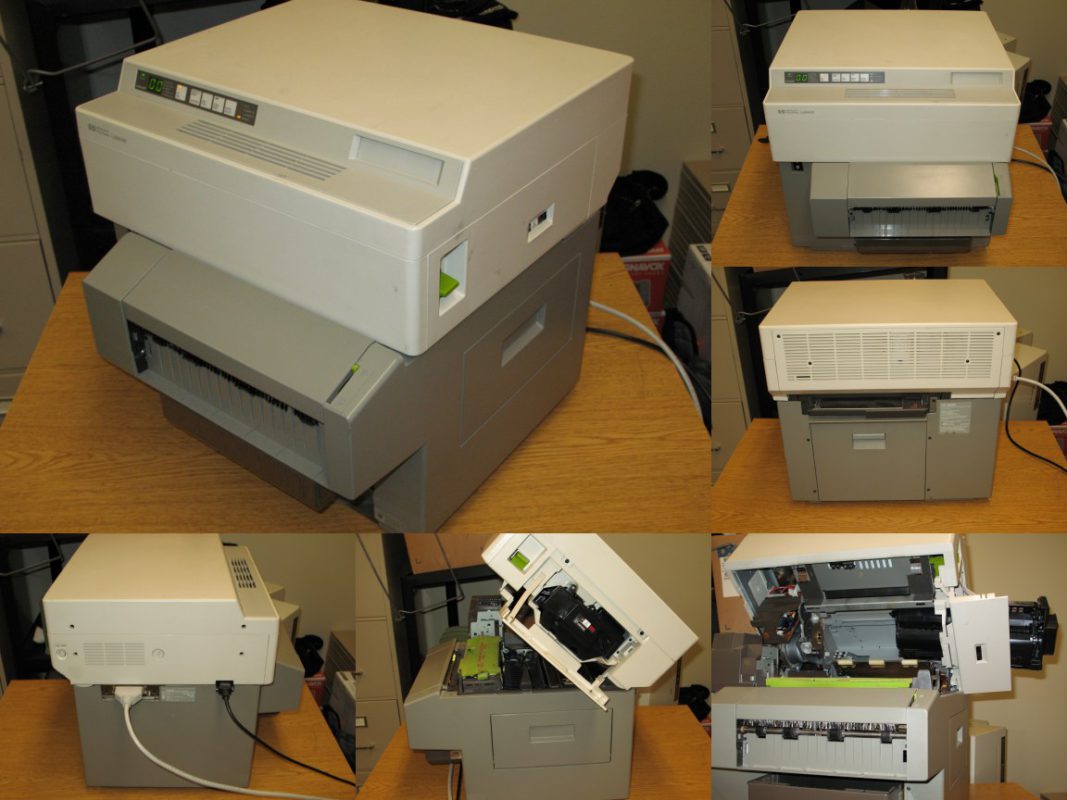The material is a very loose retelling of a note from the Financial Times (FT) with a number of my own comments.
In technology, nothing lasts forever. But when compared to the speed with which new companies and technologies emerge and disappear, it may seem that some things and gadgets are forever.

HP's invention of the personal laser printer 40 years ago was the culmination of one of the most successful corporate 'skunk works' projects ever undertaken. Skunk Works называют небольшие экспериментальные лаборатории в рамках компании, которые независимы от основного R&D департамента (своего рода свободные художники). A team of engineers from such a laboratory came up with and presented a product that not only became a hit, but also created a new market. The product came bundled with a business model based on making money from the subsequent sale of print cartridges. This idea proved to be an even more efficient monetary innovation than the printers themselves.
Profit from laser printers has not only supported HP for years, but it may even outlive the company itself.
A small digression. This means that Xerox was going to buy HP and made an offer to buy for cash and shares for a total of $ 22 per share (HP is currently trading at $ 19.52 per share). So perhaps in the future, profits from HP printers will support Xerox's business.
The situation is funny, since HP is valued at $ 27 billion, and Xerox – only $ 8 billion. Xerox's decisiveness is associated with the fact that the company recently sold its stake in Fujifilm for $ 2.3 billion, and also enlisted the support of a bank willing to sponsor the venture. What is happening does not seem quite real. But HP has confirmed that it has received a formal request from Xerox. Accordingly, since HP is a public company, then, apparently, the decision on this issue will be made at a meeting of shareholders. Xerox offered to buy shares at $ 17 each + 0.137 Xerox shares for each HP share. When translated into cash, that's $ 22 apiece. How it will end is still unknown. HP just received a formal offer last week.

So, back to the text of the note from FT. HP's phenomenal printer business can serve as a lesson for today's tech leaders. How one superfood or service, if managed properly, can turn into an airbag that will last much longer than its creators could expect. But the company has been unable to use the cash cow's profits to be safe or to come up with a hit.
Unlike their Chinese counterparts, who are always on the lookout for new digital markets and products, America's largest internet giants and high-tech consumer technology companies prefer a safe haven and focus on what they do best. Google at one time dabbled in social networks, and Facebook – search, but they quickly dropped these exercises and returned to what initially brought them profit.

For example, in Google reports, search ad revenues accounted for 80% of total ad sales and helped the company earn $ 100 billion in the last year (2018). For Apple, the smartphone iPhone has become the main product, generating more than half of the profits.
Diversification is a valuable tool for mature companies or companies with cyclical core businesses (for example, Apple that have a spike in sales when new products are launched and then a decline) After all, focusing on only one product can be dangerous. For example, at one time Yahoo was a better choice than Google in some respects. The company was # 2 in search and also had a strong display advertising business, providing much more opportunities for advertisers. But Google outplayed Yahoo in this business, and the company was left with a nose, since it had no other sources of profit.
It cannot be said that no one is trying to look for a hit product by experimenting on the side. But if earlier it was a kind of entertainment, today for many companies the problem has become urgent, when the main business has reached the stage of maturity when there can be only a slow decline.
The profit from printers has enabled HP to make a significant number of attempts to rethink its own business. For example, Carly Fiorina's attempt (CEO of HP from 1999 to 2005) to make the company a leader and consolidator of products in the then fast-growing hardware market (computers, laptops, printers, monitors). To do this, they spent 25 billion on the purchase of Compaq Computer. And another HP CEO, Mark Heard, who died less than a month ago, spent $ 13.9 billion in printer profits to buy EDS. EDS, or Electronic Data Systems, develops software and applications for the tasks of large businesses. And, of course, one cannot fail to recall Leo Apotheker, who dumped $ 9 billion on Autonomy. This happened in 2010, when the new CEO decided it was time for HP to focus on IT and consulting services, thus repeating the path IBM. Mr. Apotheker was fired in September 2011. A $ 13 million golden parachute brightened up the bitterness of the shameful dismissal.
At the same time, despite all the perturbations, the profit from printers for all time did not fall below 40% of HP's total revenues. That's what a strong product is called. But one product cannot save a company.
The high-tech business feels it is time to look for new sources of growth. A great example is a company Amazon. Its cloud computing by-product has gone off. Along the way Amazon is also in a hurry Microsoft, promoting its cloud solutions and displacing Windows from the pedestal. Meanwhile Apple has just begun the most expensive part of its own rethinking of the business, with a shift towards service. Will Apple Tv + become a new source of growth?
On the other hand, diversification can cause a company to lose its sense of purpose and go astray. The side business will eat up money without bringing anything in return. The mistake of many companies is that instead of creating new markets, they are trying to break through to existing ones, where everything has long been divided. A great example for this phrase is company Apple. There is already Netflix on the market, there are Amazon Prime and HBO. In just a couple of days, Disney + will launch, a service that is likely to be successful as Disney already has tons of lucrative franchises (like Star Wars and Marvel) that people know and love. What does Apple have? Yes, we love iPhone and loved the MacBook before, but why should we love the series from Apple? Still, the Apple Store is not going to check out new movies.
Diversification also raises a very important existential question. If the company has fulfilled its stated mission, then should it continue to exist? The main business of most high-tech giants will feed them for years to come, but sooner or later they will have to face the same challenges as HP.
The throwings described in this article are more typical for Western companies and the US market, where passions and strong competition are raging. In Russia, giants like Yandex and Mail.Ru are not threatened. They are like Christ's in the bosom of the state, and they have no real competitors in the home market.
Although Yandex's approach is to some extent also indicative. Unlike Google, Yandex is doing all it can to get into offline business – Yandex.Taxi, car sharing, food delivery. Or, for example, the Yandex.Chef service, where products are delivered to prepare dinners on their own. Yandex's approach is to find an offline business and figure out how to do it better using the internet. This helps the company to develop, but does not protect it, since it enters existing markets and does not offer something completely new or different from what competitors are doing.

Quite frankly, all these spin-off businesses of Yandex look like a side job. And when Western companies do come to the domestic market, then only the state will protect the company from the horrors of competition.
